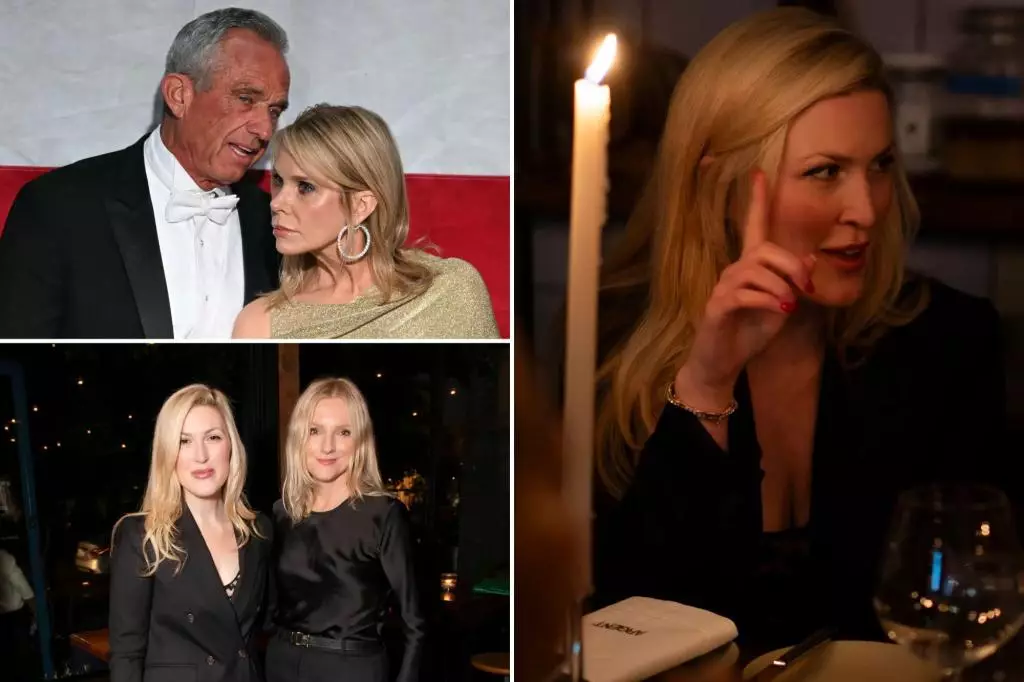In an era where personal struggles often clash with public curiosity, few navigate the tumultuous waters of fame, love, and scandal as adeptly as Olivia Nuzzi. Recently spotted at a glamorous women’s gathering in Los Angeles, Nuzzi, a noted political reporter, accentuated her chic black suit with an exquisite tennis bracelet, a remnant of a past engagement to fellow journalist Ryan Lizza. The diamond accessory, a symbol of joy from happier times, serves as a poignant reminder of her complicated emotional landscape amid her recent turmoil.
Attending the high-profile event hosted by fashion brand Argent, Nuzzi was seen holding her ground in the spotlight, exuding confidence despite the eye of the storm surrounding her personal life. Having been on leave from her position at New York Magazine following a sexting scandal involving Robert F. Kennedy Jr., her appearance marks a significant moment of re-emergence. Nuzzi’s choice of attire spoke volumes; the black suit was not only fashionable but also a strategic representation of professionalism and resilience. Observers at the gathering noted that she appeared well-received, garnering warmth from her colleagues and friends, suggesting that she is managing to maintain her composure even during challenging times.
The event included other noteworthy attendees such as actress Kate Mara and director Ava DuVernay, illustrating Nuzzi’s position within circles that value reputation and discretion. This juxtaposition raises questions about the societal expectations for women, especially those in high-profile careers, and the judgments they face in moments of personal crisis.
As Nuzzi navigates her public and private battles, the narrative surrounding her engagement with Lizza has taken a dramatic turn. The ongoing legal skirmish describes a series of allegations and denials that paint a vivid picture of betrayal and emotional strife. In court files, Nuzzi accuses Lizza of blackmail and emotional manipulation, claiming he threatened to harm her reputation after their split. Lizza’s counterclaims reveal his perspective, framing Nuzzi’s actions within the context of her alleged infidelity with Kennedy.
This back-and-forth creates a compelling narrative theater, where personal grievances are played out in a very public forum, raising ethical questions about the treatment of women in similar positions. Critics argue that Nuzzi, in particular, faces disproportionate scrutiny—a point echoed by insiders who suggest that men in comparable situations often escape the implications tied to their actions.
Nuzzi’s case is emblematic of the challenges female journalists face, where personal relationships are frequently scrutinized through a lens tainted with stereotypes and assumptions. The implications of her overlap with political figures indicate a double standard that perpetuates the notion of female reporters as inherently compromised. This notion was underscored by a past tweet from Nuzzi highlighting similar portrayals in television, showcasing the persistent cultural narratives around women in journalism.
However, her recent public engagement serves as a testament to her ability to perform professionally despite the ongoing emotional turmoil. Through carefully curated appearances and the apparent support of colleagues, she signals resilience and an opportunity for reinvention. In a city known for allure and transformation, Los Angeles offers her a backdrop conducive to personal and professional evolution—something her supporters emphasize during these trying times.
Understanding the intricacies of Nuzzi’s situation requires consideration of the broader implications of public life. The interest in her journey—complete with a high-profile engagement and ensuing scandal—mirrors a societal hunger for narratives of scandal intertwined with redemption. Observers note that while tabloids may revel in sensationalism, her story serves as a broader commentary on the fragility of female status in a male-dominated sphere.
In her appearance at the Argent event, where prominent individuals congregated, Nuzzi projects an image of strength—a narrative likely to be embraced by those who believe she represents a new wave of media figures unyielding in the face of public scrutiny. Ultimately, the story of Olivia Nuzzi highlights not only individual resilience but also the necessity for a cultural shift in how we perceive the intersections of personal lives and professional legacies.
As the saga continues, it becomes clear that the ramifications of events do not just shape individuals; they reflect a collective consciousness that both empowers and challenges women in media today. How Nuzzi’s journey unfolds remains to be seen, yet her strength in navigating these turbulent waters could potentially redefine expectations for professional women facing similar circumstances in the limelight.

Leave a Reply